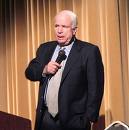 Do Mike Huckabee’s surprising Super Tuesday victories in the Deep South–where he took Tennessee, Georgia, Alabama, Arkansas and West Virginia–translate into a delegate boost that puts him within reach of the Republican nomination? Almost certainly not, though some of the next primary states in line–Virginia, North Carolina, and Texas, provide some Huck-friendly territory. But Huck’s surprise wins yesterday offered important lessons about the state of the Republican race:
Do Mike Huckabee’s surprising Super Tuesday victories in the Deep South–where he took Tennessee, Georgia, Alabama, Arkansas and West Virginia–translate into a delegate boost that puts him within reach of the Republican nomination? Almost certainly not, though some of the next primary states in line–Virginia, North Carolina, and Texas, provide some Huck-friendly territory. But Huck’s surprise wins yesterday offered important lessons about the state of the Republican race:
1. Even as he has emerged as the Republicans’ national favorite–with twice as many delegates as Mitt Romney and three times as many as Mike Huckabee–McCain’s problems with the evangelical base of his own party are only mounting. More on that here.
2. Mitt Romney’s years-long effort to become the Christian Right’s candidate has failed. Yes, he won over many movement elites, including PR magnate Mark DeMoss, Dominos Pizza founder Tom Monaghan’s, and–tacitly at least–Focus on the Family’s James Dobson. But the movement’ rank-and-file never accepted him. There are three reasons why. First, it’s difficult to campaign as a social conservative when you were emphatically pro-abortion rights and pro-gay rights just a few years ago. Second, Romney’s a Mormon, which exacerbated the trust issues with evangelicals. And third, it’s difficult to be the Christian Right’s golden boy when you’re running against a Baptist minister. In the-pews evangelicals clearly preferred an alternative to John McCain yesterday, and it was Huckabee. Huck won evangelical heavy states like Missouri and Georgia decisively, while Romney’s support came from party moderates. But the same problem that plagued Romney among evangelicals was also a curse among moderates: he won enough of them to be competitive, but not to win moderate states like New York and California.
3. David Kuo’s mantra for the ’08 cycle—that pronouncements of Christian Right leaders matter less than they used to—is spot on. (Remember the Christian Broadcasting Network’s Pat Robertson endorsing Rudy Giuliani last year?) In a last-ditch effort to stop McCain, James Dobson issued a blistering statement against him yesterday. But Dobson’s evangelical following, while hardly breaking decisively for McCain, nonetheless provided crucial support for him in many states, including Arizona. At the same time, Huckabee’s surprise Tuesday victories came without help from Christian Right titans like James Dobson or the Family Research Council’s Tony Perkins, who were skeptical that Huck could be a viable national candidate and thought him too soft on fighting terrorism and illegal immigration.
4. With the evangelical movement on your side, money and media matter a lot less. Huck’s campaign has always run on shoestring, but Romney’s millions couldn’t buy Huck’s evangelical support. And though the news media wrote Huckabee off after he failed to win another state after Iowa—Huckabee was begging Anderson Cooper to ask him questions during last week’s CNN presidential debate—Huck’s evangelical network more than compensated. The “Invisible Army” strikes again.
5. For Republican candidates, winning a huge slice of the evangelical vote is still a prerequisite s for winning the GOP nomination. But it’s not enough. For all his success yesterday, Huckabee still hasn’t broken out of his evangelical base. He hasn’t won a single state where evangelicals account for less than half of primary voters. In key swing states like Missouri, Huckabee won only 20-percent of non-evangelical voters. Which is why the fears of Christian Right leaders over Huckabee’s national viability are well founded.
8

